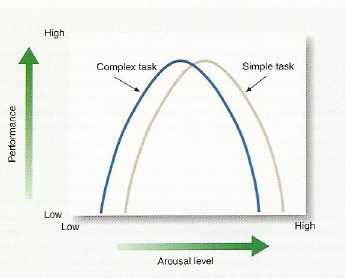What is the Optimal Arousal?
- Yerkes-Dodson Law:
- performance on a task is best for an intermediate level of arousal, and performance gets worse for extremely low and high levels of arousal
e.g.
e.g. the optimal arousal level for doing a simple addition problem would be higher than for doing a complex geometry problem.
- optimal arousal is also higher for well-learned tasks than for novel tasks.
- the optimal arousal level for a given task will vary from person to person depending on their background.
e.g. an outstanding math student will have a higher optimal level of arousal for doing arithmetic than would a poor math student. (so an outstanding student may have to "psych up" before an exam and the poor student might have to relax)
- Optimal Arousal and Sports Performance:
- if have too much arousal
e.g. Basketball: if think about movements on how to shoot a free throw, then the normal automatic process will be disrupted.
- if have too little arousal
- Sonstroem & Bernardo (1982) Research on female collegiate basketball players

